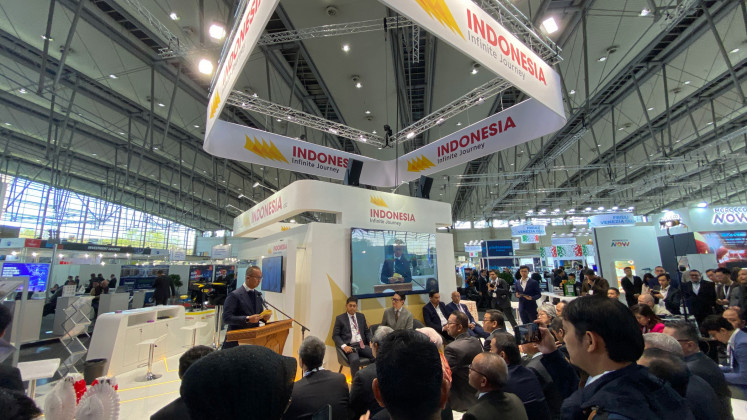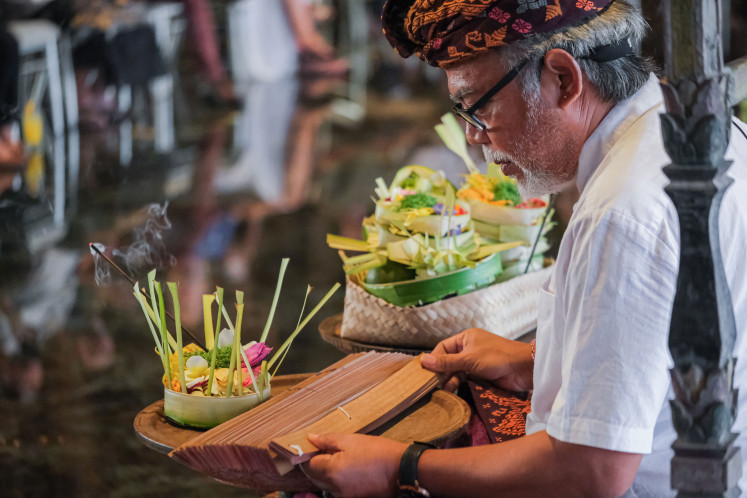Indonesia's largest landscape-level forest restoration project ongoing in Kampar Peninsula
APRIL Group has adopted a landscape approach in restoring 150,000 hectares of environmentally important peat forest in the Kampar Peninsula in Riau province, Sumatra, involving multiple stakeholders, including local communities
Change Size

APRIL Group has adopted a landscape approach in restoring 150,000 hectares of environmentally important peat forest in the Kampar Peninsula in Riau province, Sumatra, involving multiple stakeholders, including local communities.
Indonesia's peatland areas are some of the most sensitive ecosystems in the world, while the Kampar Peninsula landscape is one of the ecologically sensitive peatland areas in Southeast Asia.
Kampar's tropical forests are rich in biodiversity and support threatened and vulnerable wildlife species, such as the Sumatran tiger and sun bear.
However years of selective logging practices, illegal encroachment and uncontrolled canal development had degraded the Kampar Peninsula forest area, while a lack of active forest protection has put the fragile ecosystem under threat from illegal forest clearance for slash-and-burn agriculture.
As forest cannot be conserved in isolation, a landscape-level approach was adopted to protect and restore the peat dome at the core of the Peninsula, taking into account the ecological situation, encroachment threats as well as the many stakeholders in the area.
In 2013, APRIL Group initiated the Restorasi Ekosistem Riau (RER) project to protect and restore more than 20,000 hectares of peat forest in Kampar Peninsula in partnership with Fauna & Flora International (FFI) and local social NGO Bidara. The program operates under eco-restoration licenses granted by the Indonesian government.
Following two years of restoration efforts, drawing on the expertise of APRIL Group, FFI and Bidara as well as local communities, the collaborative restoration of this unique peat forest was expanded to 150,000 hectares in 2015.
This increased commitment to Riau Ecosystem Restoration (RER) is believed to be the biggest investment by a private sector company in a single eco-restoration project in Indonesia, covering assessment, restoration and protection, management and partnerships.
As part of the assessment method, more than 200 remote cameras ('camera traps') were installed around the RER area to evaluate its biodiversity.
'What has excited me is the level of biodiversity we have uncovered in the Kampar Peninsula ' it has been thrilling to find out what lives there. We have found tigers, civet cats and other rare species and have even discovered a new species of snake,' said Dr. Tony Whitten, FFI's Asia-Pacific Regional Director.
APRIL Group views communities around the ecorestoration area as important stakeholders in the conservation efforts. RER engages villagers from neighboring communities as rangers involved in protecting and restoring the forest. At a satellite plant nursery near the rangers' station, seedlings collected from the wild are being propagated for replanting.
'As well as forming an important part of the company's sustainability program which commits to conserve one hectare for every hectare planted, the RER project represents a living, breathing example of the landscape approach in action, said Dr. Petrus Gunarso, Conservation Director of APRIL. 'In addition to the 150,000 hectare restoration project under RER, since 2005 250,000 hectares of High Conservation Value forest is under conservation, ' he added.
Restoring and conserving the core of the peninsula would bring benefits such as preserving remaining forest areas, improving local community livelihoods, reducing fire risk and preserving water sources that feed into local rivers, according to Gunarso.
'I am often asked about the motivations behind the project and there are several, both environmental and commercial. Importantly, it's the right thing to do for the landscape; protecting the Kampar peat dome has far-reaching benefits for the wider landscape.'
RER also contributes to sustainability efforts, diversifying the local employment market and providing alternatives to agriculture through the small businesses that have grown around the project, Gunarso said. It helps to combat deforestation, while ensuring that important ecosystem services, such as water, oxygen and wildlife, are not lost.
'More important than declaring large hectares under conservation is the active work of identifying, protecting and effectively managing the conservation areas in Indonesia's complex landscape. This requires the solid buy-in and collaboration of the many stakeholders in the area.' he added.
Landscape approach
RER adopts a four phase model of protecting, assessing, restoring and managing. The areas must be effectively protected from the threat of illegal encroachment to allow restoration to take effect. Assessing the biodiversity and analyzing its result serves as basis for conservation planning.
'Our partners recognize that RER is a living, working blueprint ' an evolving example of what other public and private sector organizations more broadly can achieve through strong partnerships and vision,' said Gunarso.
During the UN's big climate meeting (COP 21) in December last year, as governments met in Paris to finalize a global climate treaty, APRIL announced the expansion of the RER project to 150,000 hectares and the multi-year US$ 100 million investment for its restoration and conservation activities. (+)









